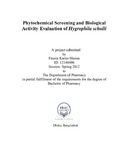Phytochemical screening and biological activity evaluation of Hygrophila schulli

View/
Date
2017-07Publisher
BRAC UniversityAuthor
Shoma, Fauzia KarimMetadata
Show full item recordAbstract
Hygrophila schulli (Family: Acanthaceae) is a crucial medicinal plant which is commonly
habitat in the sub continental zone. The plant is frequently used in the Indian Ayurveda
system for the treatment of urogenital tract diseases such as in dysuria, urinary calculi and
cystitis due to its diuretic property. Moreover, the plant has also established its significant
potentiality in treating kidney stone in the folk medicine system. In spite of its strong
medicinal value, only sporadic attempts have been made for the scientific and methodical
validation of these traditional uses. The current investigation aimed to determine the
phytochemical constituents as well as to evaluate antioxidant, antimicrobial and cytotoxic
potentials of the methanolic extract of this plant. The investigation revealed the presence of
several phytochemical compounds namely, alkaloids, flavonoids, phenols, glycosides,
tannins and steroids. The antioxidant potential of the plant was evaluated by means of DPPH
assay and total phenolic content assay. Both the assay showed significant antioxidant
potential of this plant. It draws a fine line to use H. schulli in cardiovascular and antiinflammatory
diseases. Brine shrimp lethality bioassay was also performed on this plant,
which showed a dose dependent relationship of concentration and % mortality of shrimp
nauplii. In this study, the LC50 values of the standard, vincristine sulphate and methanolic
extract of H. schulli were obtained 1.115 g/mL and 294.182 g/mL respectively. However,
the crude methanolic extract as well as the pet ether fraction, chloroform fraction, ethyl
acetate fraction and aqueous fraction of H. schulli showed no sensitivity in antimicrobial
assay. Based on these investigations, it may be suggest that the plant H. schulli can be used
as a potential medicinal plant.
